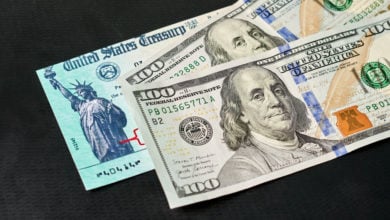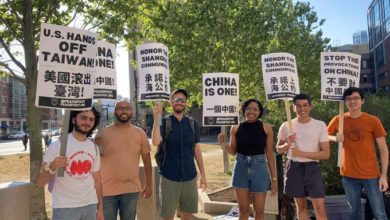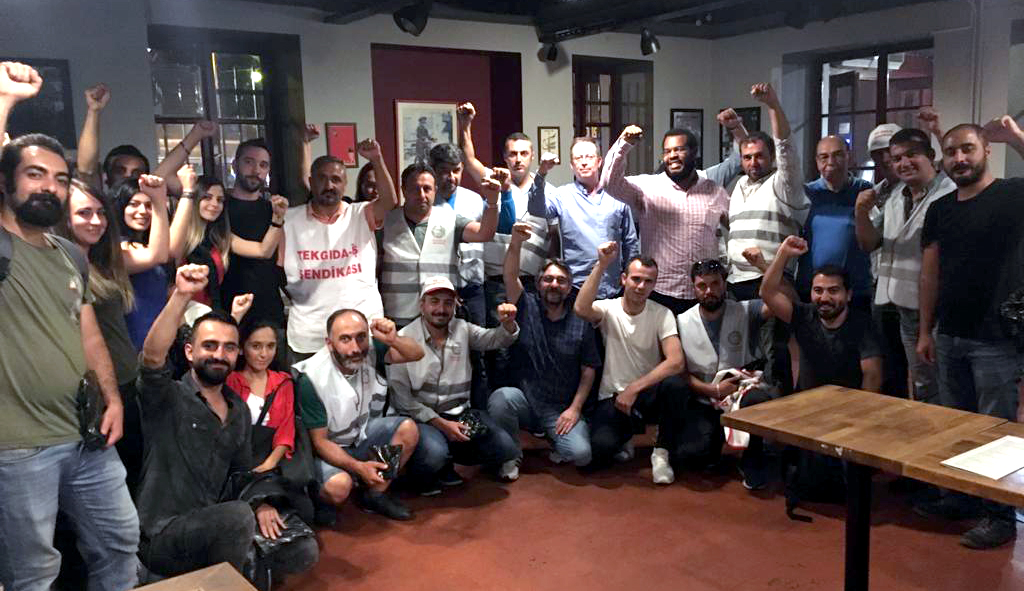The following is a rush transcript of the first segment from the Sept. 16 episode of Loud & Clear with Brian Becker on Radio Sputnik. Copy may not be in its final form. Click here to listen to the entire episode.
Brian Becker (BB): From the studios of Radio Sputnik in downtown Washington, D.C., it’s “Loud and Clear”. We take you inside the news, five days a week. It’s happening and it’s happening now. I’m, Brian Becker.
The Obama Administration is making a last ditch effort to get the Trans-Pacific Partnership, the TPP, passed by the end of the year.
With both Donald Trump and Hillary Clinton officially opposed to the trade pact and the window of opportunity shrinking for Obama, can it actually pass? Or is the deal already doomed for failure like its companion piece, the Trans-Atlantic Trade and Investment Partnership, TTIP? What would the failure of the TPP mean for the U.S. in the Asia-Pacific?
To address the importance of the TPP, we are joined for the full hour by Kevin Zeese, he is a lawyer and political activist with “PopularResistance.org”, he’s talking to us from Baltimore, Maryland. We are also joined from London by Steve Keen, Professor of Economics at Kingston University and author of “Debunking Economics”. Welcome Kevin and Steve.
Kevin Zeese (KZ): Thanks a lot.
Steve Keen (SK): Nice to be here.
BB: Kevin Zeese, let’s begin with you. Obama is making a final effort to get the TPP passed in Congress. On Monday he met with Nancy Pelosi, Mitch McConnell, Harry Reid and Paul Ryan. In other words, both the Republican and Democratic party leadership, to discuss, among other things, this push.
Isn’t it an affront to Democracy that they’re trying to sneak this highly unpopular agreement through?
KZ: Yes, the only chance they have of really considering this is what’s called the “lame duck” session. That’s when, after the election and before the next Congress comes in, the [current] Congress considers issues. And that would mean that members –who lose their election or who are retiring and looking for their next job– will be considering the issue. They won’t have to answer to the Public, and that is very problematic scenario.
President Obama’s made a big push, along with the transnational corporations, he’s been traveling around the country are meeting with the business groups and urging them to spend a lot of money on lobbying and advertising in this final push.
He’s been meeting with key members of Congress, as you mentioned. It’s going to be tough, a close vote. There’s no way to predict it right now.
There’s evidence –indications– that a lot of people who question the Republican side, who supported “Fast Track”, which was a very close vote [and] which gave Obama trade authority to go through Congress very quickly, with very little Congressional review. But a lot of those Republicans will not support the TPP. There are a couple of Democrats as well, who voted for [Fast Track] who will not support the TPP. And if those numbers hold true it won’t pass. But, it’s a very different situation because of Fast Track.
Let me just quickly say Fast Track allows the President to submit the TPP once! If it’s voted down, it’s finished. And so Obama will be putting all his eggs in one basket. If the deal goes forward, it’s “up or down”, “dead or alive”. So that will put pressure on corporate members of Congress who might not like the details of the TPP, but will think it’s better than nothing and [they] may not be confident that Hillary Clinton or Donald Trump would negotiate a better deal. So that’s what the fight’s going to be. It’s not going to be an easy one.
BB: But it will be after the election, the vote?
KZ: Yes, [the vote] will be after the election and we’ve been organizing a “No Lame Duck Rebellion”. If you go to “Flush the TPP / No Lame Duck”, you can sign up. Almost four thousand people have already signed up. Many of them –about a half– saying they’ll come to Washington D.C. to join in protest.
We will do everything we can as a movement. The Movement has been very effective throughout these last five years. So we’ll [continue to] do everything we can to try and stop the TPP from going forward.
BB: Steve Keen, you’re not here in the United States but of course you’re paying attention to the politics. There is the inter-tangling of politics, the timing of the political season is of key importance.
While in Laos, President Obama, he was at the ASEAN Summit [Association of Southeast Asian Nations], said, “We are in a political season now, and it’s always difficult to get things done. So, after the election, I think people can refocus attention on why this is so important I believe that will get it done.”
The implication there is, when people are actually up for election, and the electorate has a chance to view them and observe them and judge them based on their decisions –under those circumstances– none of these politicians could really –or not many of them– could vote for TPP. But afterwards, yes they might be able to do it, when they’re not being held to account.
SK: It’s been remarkable to me the extent to which the entire thing has been done under a veil of secrecy, you can’t even call it a “veil”, it’s more like an iron curtain of secrecy.
And the fact that the previous agreement –which was defeated, fortunately– people weren’t allowed to read parts of what they were voting on. So to say that it’s better to wait so that people can “focus their minds” and “be part of the political process”, implies this is a typical political document, where it’s open to a general examination and criticism, and feedback from public groups.
[Whereas in this case] this whole thing’s being shielded from the Public. So I don’t see that argument as a convincing one, as to why it should be decided in the “lame duck” period.BB: Steve Keen, There’s an equation –certainly in the mainstream media but throughout American society and I think throughout Western societies throughout societies that are based on the so-called “free” market– that there is a conflation between the free market economy or a capitalist economy and “Democracy”. [As compared to] socialism, obviously as the counter point to [capitalism, which is often] equated with “totalitarianism” or “authoritarianism”. But if you’re looking at this political process, there’s nothing [even] remotely tied to anyone’s public notions of “Democracy”.
SK: No, the only thing [this political process] is really tied to is “rights” of corporations to sue governments! [Laughing] Which, in some ways major corporations with the bills like this and the TTIP with these two documents, they’re all about giving corporations the right to overrule governments.
Now, that’s not socialism it’s almost more like “totalitarianism corporatism” that these bills have all been part of. And it’s one of many reasons why I’m quite happy to oppose this legislation, hope that it gets voted down.
BB: Kevin Zeese, why is President Obama so committed to the TPP? When, Hillary Clinton, who once supported [the TTP] –in fact she once said that it was the “gold standard” of trade agreements– is opposed to it?
Talk about the politics of that. Why does Obama support it so much, why is he so committed to it and why is Hillary Clinton changed her tune? …Or has she, really?
KZ: Well, that’s a good question, “has she really?”. President Obama always has been a “Wall Street Democrat”. He’s always favored policies that are market-based. His health care plan avoided what we needed, which was a “Single Payer Improved Medicare for All”. Which would have been a government-funded insurance.
Instead, [Obama] moved in favor of a health insurance/private insurance based program, where people are forced to buy private insurance and where the government subsidizes private insurance industry [in the amount of] more than a hundred and fifty billion a year.
[Obama’s health care] has been a disaster for consumers because they’ve had to pay a lot more in premiums, [but they] get a lot “skimpier” coverage. Major medical centers are often not included in people’s plans.So, yeah, you can get insurance if you have a pre-existing cancer diagnosis, but you won’t be able to go to we will go to a major cancer center. And if you do, you’ll be paying out of your pocket for it.
that’s the kind of health plan he put forward. Not a “Public Good”, but and investor’s dream– turning a social service, a “health service”, into a “commodity for-profit” for investors.
And really the TPP follows that model. So does TTIP and so does the one we really never hear about, “TISA”, the Trade In Services Agreement, which may be the most dangerous of all. And [TISA] is the one they’ve kept secret best.
Your guest is right, the strategy throughout this process has been secrecy. They know that the more people know about it, the less likely they’ll get support. Now one of the things we’ve won in the “Fast Track” debate was to have the TPP made public.
So we can all see it now. It’s been examined by Labor Unions, environmental groups, food groups, a whole range of people.
And some of the issues that have been effected by [the TPP] is why it’s been examined from a lot of different angles, and that’s why there’s a lot of opposition, because now we can see it.
And the secrecy that the United States imposed is very drastic, the Europeans were shocked by it. [The Europeans] found it very hard to work under the conditions the U.S. insisted on, as far as secrecy goes. So that has been a part of Obama’s process as well.
Obama also has three Presidential Libraries, three Presidential Centers he wants to build. If you look at the Board of those centers you’ll find a lot of the transnational corporations who will benefit from the TPP [on them]. [Obama] needs to raise six hundred million dollars –[which is this project’s] current budget– because those things get more expensive as they go forward. At the current budget, he needs six hundred million dollars to create those three Obama Centers in Chicago, New York and Hawaii. So, he needs to raise a lot of money.
So, I think it’s just his natural political instinct is to support “market solutions” …to support “Industrial Rights”. And this is definitely a series of agreements –all three of them– that make corporations more powerful in government. And he’s also someone who knows how to raise money from big business. That’s what he wants to do when gets through his presidency.
BB: Steve Keen, help the audience understand that trajectory, whereby there has been almost a consensus that these kind of “Free Trade” Agreements, so-called, should be –and are– required as a model for the current economic world order.
It wasn’t always this way. It’s really had significant momentum –especially in the United States– since the passage of NAFTA which went into effect January 1, 1994. In other words, twenty-two years ago. But talk about why this has become sort of the “mantra”, almost the “Article of Faith”, within the Big Banking and big transnational corporate circles.
SK: Well it goes right back to the original argument for “specialization” and free trade from [English political economist, David] Ricardo, back in the Eighteen-hundreds. I’ve always regarded this as the “economic one trick pony” –the one thing they can do to look really clever– and that has become the way conventional economists think about how the Economy actually operates.
It comes down to saying, “if we enable specialization, [then the result will be] production will rise. Therefore anything that enables specialization is ‘a good thing’.”
You can drive a truck through the arguments for “free trade”, on that front. The most important part of it being that, they argue that specialization will occur by letting you shuffle your existing resources around. As [David] Ricardo argued, you can “specialize”. Rather than England producing both wine and cloth, [England] can specialize in cloth and Portugal can specialize in wine, [somehow] there will be more of both.
Ricardo never quite explained how you can turn a “spinning jenny” [an advanced, cloth manufacturing machine] in Portugal into a wine press, and a wine press in England into a spinning jenny”, which would be required to make that particular “one trick pony” trick actually work!
So it’s always been a “debating ploy”, it’s never been properly thought through.
But you go forward, over time, and the whole idea of “expanding” markets –and “improving specialization” because you expand markets– has become the “mantra” of Economics in general.
America in many ways had an “Industrial Development Policy”, certainly after the Second World War and the Great Depression, that was influenced by more of a “Keynesian macro economics” approach to thinking about how one manages the economy, but over time this “macro economics and free trade” thing came forward, and in, what I call their “Neoclassical School of Economics, [and] wiped out the remnants of the “Social Democratic/Keynesian” approach. And with that done, all they had left to say on how to “improve output” was no longer about “industrial policy” or “improving worker-management relationships” and stuff like that. Now it was all about “free trade”. So you’re just being swept up in this whole thing.
And what I find ironic, right now is this final push to get the ultimate free trade document –or the “Ultimate Corporate Rights” documents, rather than “Free Trade” document. Getting this Ultimate Corporate Rights document through on the basis of conventional economic theory, is happening at precisely the same time as mainstream economists are saying, “Our models are lousy, they don’t work. They don’t explain the real world. And you shouldn’t base policy on them.” This is turning up from: Paul Bremer [who lead George W. Bush’s illegal invasion and occupation of Iraq], literally today; from the World Bank, who’s disparaging mainstream macro economic models; [Narayana] Kocherlakota, some time ago, the [former] President of the Federal Reserve in Minneapolis; and even Olivier Blanchard [chief economist at International Monetary Fund, IMF, 2008-15 and MIT’s Economics Professor]. All these people are saying, “Look, our theories are so bad, you should never use them!” But, ironically, here’s the final thrust of the Obama Administration saying, “Let’s do this because economic theory says,’it’s a good thing’!” What it amounts to, of course, is the [triumph of] “Corporate Rights” over “Human Rights”.
BB: Kevin Zeese, we have about a minute left before we go to break. There are “economic theories” and then there are, of course, “vested interests”. Talk about that if you would.
KZ: Yeah, [Steve Keen] gives great analysis. It’s a big mistake to call [these deals], “Free Trade”. They’re not free trade.
It’s amusing when Gary Johnson –the Libertarian, who opposes “crony Capitalism”– calls [these deals] “free trade agreements”, when it’s really “crony Capitalism on steroids”.
If Obama is successful in putting these agreements in place, it will create a “web of law” will make corporations dominant worldwide. The TPP alone will do great damage because other countries can join the TPP. Even if they don’t pass TTIP, European countries can choose to join the TPP. It’s an unusual agreement that way. And so it can grow.
And let’s talk a little about “TISA”, when we get back [from this segment’s break] because the “Trade In Services Agreement” in fifty-two countries! And it covers 80% of the U.S. economy, because “services” are major! They cover everything from Postal Service, health service, attorneys, accountants, to service in restaurants.
[TISA] is a massive agreement and it’s getting no coverage. It’s a very serious attack on people’s rights. This is a conflict: Corporate Rights versus Human Rights. Do we put people and planet before profits? If these [trade agreements] pass we’re putting profit first ahead of the planet and ahead of the well-being of the People, and that’s a big mistake.BB: that’s the voice of Kevin Zeese. You are listening to “Loud and Clear”, we will be back.





